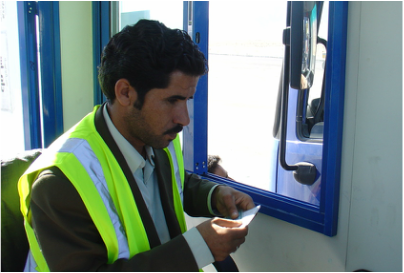Aqaba, Jordan, Truck Control System
The Company's flagship project, the Aqaba Truck Control System controls the movement of more than 4,000 trucks daily that pick-up or drop-off cargo at the ports and other facilities within Aqaba, Jordan's sole seaport. This is one of the largest e-government systems in the Middle East and received the 2009 award from the Intelligent Transportation Society of America for the best use of advanced technology in surface transportation in the world.
Trucks receive a permit from the System authorizing a requested operation, generally picking up or dropping or cargo.
This authorization is given only after the truck dispatcher has entered key information into an internet-based application, and that information, along with other pertinent information, such as custom's clearances and insurance information, are validated and the system confirms that the requested operation can be completed, including monitoring capacity at the terminals and on the roads.
Truck movements are controlled by a system that combines process redesign with an integrated software platform for the port terminals and truck dispatchers, staffed checkpoints and electronic gates, terminal capacity controls, routing algorithms and artificial intelligence to optimize capacity utilization, and a proprietary RFID tag system on over 12,000 trucks managing five entry and exit points from Aqaba, four marshaling yards, and 39 terminals and other destinations in Aqaba.
The System is operated by Nafith International under the terms of a Public-Private-Partnership (PPP) agreement with the Aqaba Special Economic Zone Authority (ASEZA).
Impact
More Information
Aqaba Truck Control System Overview
Aqaba Truck Control System Case Study
Thinking Highways, "Crossing Jordan"
Nafith Evaluation, Dr. Hani Mahmassani, Northwestern University
Economic Impact of the Nafith System, Nathan Associates
NTELX Wins 2009 Best Intelligent Transportation Award
Trucks receive a permit from the System authorizing a requested operation, generally picking up or dropping or cargo.
This authorization is given only after the truck dispatcher has entered key information into an internet-based application, and that information, along with other pertinent information, such as custom's clearances and insurance information, are validated and the system confirms that the requested operation can be completed, including monitoring capacity at the terminals and on the roads.
Truck movements are controlled by a system that combines process redesign with an integrated software platform for the port terminals and truck dispatchers, staffed checkpoints and electronic gates, terminal capacity controls, routing algorithms and artificial intelligence to optimize capacity utilization, and a proprietary RFID tag system on over 12,000 trucks managing five entry and exit points from Aqaba, four marshaling yards, and 39 terminals and other destinations in Aqaba.
The System is operated by Nafith International under the terms of a Public-Private-Partnership (PPP) agreement with the Aqaba Special Economic Zone Authority (ASEZA).
Impact
- The System has increased Jordan's GNP by US$100 million annually, according to an analysis by Nathan Associates.
- Inland transportation costs have dropped by 20%, attributable to reduced truck turn times and other productivity gains, according to an analysis by Professor Hani Mahmassani, Northwestern University.
- Truck congestion in the city of Aqaba has been eliminated.
- Pollution and fuel consumption have been reduced.
- The visibility of activities at the port have been increased for the public and private-sector users of the System.
- The System has contributed to the modernization of Jordan's land transport sector.
More Information
Aqaba Truck Control System Overview
Aqaba Truck Control System Case Study
Thinking Highways, "Crossing Jordan"
Nafith Evaluation, Dr. Hani Mahmassani, Northwestern University
Economic Impact of the Nafith System, Nathan Associates
NTELX Wins 2009 Best Intelligent Transportation Award

